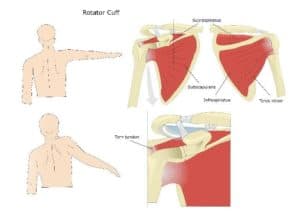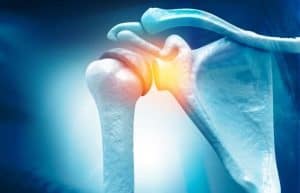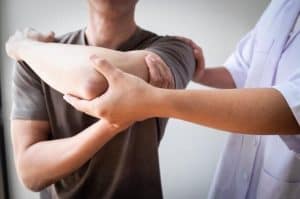Rotator Cuff Tear Repair in Chillicothe, OH
Rotator Cuff Overview
The rotator cuff is a group of muscles and tendons in the shoulder that provide shoulder stability and enable shoulder mobility. The rotator cuff muscles begin at the scapula or shoulder blade and are connected to the head of the humerus, which is the upper arm bone. The muscles and their tendons form a “cuff” around the ball-and-socket joint.
The four muscles of the rotator cuff are the subscapularis, supraspinatus, infraspinatus and teres minor. These muscles help stabilize the shoulder joint and allow the shoulder to move smoothly. When a rotator cuff is torn, a tendon is no longer fully attached to the humerus and the shoulder joint’s stability and range of movement can be affected.

Diagnosing Rotator Cuff Tears
Rotator cuff tears can be full or partial. A full tear is the complete separation of the tendon from the bone. In a partial tear, the tendon attachment is damaged, but not completely severed.
To help diagnosis a rotator cuff tear, Dr. Cohen or one of his sports medicine colleagues will obtain a complete “history of present illness” from you. The doctor will conduct a focused, comprehensive physical exam to evaluate your shoulder for areas of tenderness, assess range of motion and establish whether you have normal or decreased arm strength. Depending on the findings they may order an X-ray, perform an ultrasound and/or order an MRI.
Rotator Cuff Tear Causes and Risk Factors
Rotator cuff tears can occur through chronic injury, acute injury or degeneration.

- Chronic injury – Repetitive overhead shoulder motions such as weightlifting, tennis, baseball, carpentry or swimming can lead to rotator cuff tears over time.
- Acute injury – A rotator cuff tear can be caused by lifting an object that is too heavy, falling down on your arm or a motor vehicle accident.
- Degeneration – A rotator cuff tear can also be caused by the slow wearing down of the tendon over time. This occurs naturally through aging. People over the age of 40 are at greater risk.
Rotator Cuff Tear Symptoms
The most common symptoms of a rotator cuff tear include:
- Shoulder pain, especially with activity and at night
- Muscle weakness
- Stiffness, especially first thing in the morning
- Swelling and tenderness
- Loss of active range of motion (sometimes someone else can rotate your arm for you)
- Cracking and popping
Why Choose Dr. Cohen?
OVER 20 YEARS EXPERIENCE
One of the first orthopedic surgeons employed by a large hospital. Dr. Cohen spent 20 years.
TRUSTED BY OVER 100,000+ PATIENTS WORLDWIDE
Over his distinguished career, Dr. Cohen has cultivated a reputation of excellence and trust among his patients and his peers.
UTILIZING THE LATEST TECHNOLOGY
To achieve the best surgical outcomes, Dr. Cohen utilizes the most advanced technologies and techniques, keeping his practice state of the art.
PATIENT SAFETY IS TOP PRIORITY
An individualized, patient-focused process coupled with decades of training and experience help ensure maximum safety for all of Dr. Cohen’s patients.
Rotator Cuff Tear Treatment Options
In some cases, a rotator cuff tear can be treated nonsurgically, with rest, immobilization through the wearing of a sling or a brace, nonsteroidal anti-inflammatory medications or physical therapy. More severe cases can require surgery.
Rotator Cuff Repair Surgery
If nonsurgical treatment does not improve your symptoms or you’ve sustained a more severe injury, all-arthroscopic rotator cuff repair surgery may be recommended. Dr. Cohen will evaluate the best treatment option for you based upon the type of tear you have, your age, activity level, and the presence of any other injuries.
In many rotator cuff repair surgeries, Dr. Cohen utilizes the Rotium™ Bioresorbable Wick by Atreon Orthopedics. This FDA-approved device has been shown to increase the strength of the rotator cuff repair by 34 percent at 6 weeks postop, and 74 percent at 12 weeks postop (versus rotator cuff repaired without Rotium).
Rotator Cuff Tear FAQs
Can I Cause Further Damage If I Keep Using My Shoulder with a Rotator Cuff Tear?
 It’s common for patients with rotator cuff disease to experience pain and weakness after a minor injury. However, a rotator cuff tear can get larger and lengthen with repeat use or additional trauma. If your injury was caused by repetitive work or activity, continuing to put stress on the shoulder can cause further damage. Worsening pain and less shoulder strength may indicate that the tear is extending. Waiting to address your rotator cuff tear may lead to a more in-depth procedure.
It’s common for patients with rotator cuff disease to experience pain and weakness after a minor injury. However, a rotator cuff tear can get larger and lengthen with repeat use or additional trauma. If your injury was caused by repetitive work or activity, continuing to put stress on the shoulder can cause further damage. Worsening pain and less shoulder strength may indicate that the tear is extending. Waiting to address your rotator cuff tear may lead to a more in-depth procedure.
Do I Need to Have Surgery for a Rotator Cuff Tear?
Rotator cuff tears can often be well-managed with rest, anti-inflammatory medications, physical therapy and steroid injections to restore strength and lessen pain. Some tears may heal on their own, but this is not common. However, you can achieve good function through non-surgical treatments.
Dr. Cohen may recommend surgery to repair your rotator cuff tear if you lead an active lifestyle and rely on overhead arm movements for work or sports. The procedure can relieve persistent weakness and pain when lifting or reaching. Those who play tennis, baseball or swim typically need surgery to heal the tear.
What are My Surgical Options for a Rotator Cuff Tear?
 Shoulder arthroscopy uses a pencil-sized video camera called an arthroscope to look inside your shoulder. Dr. Cohen often performs the procedure to identify shoulder problems, but he can use small surgical tools to repair the rotator cuff with the arthroscope. He specializes in arthroscopic repair, and the details of your procedure depend on what he finds with the device. A partial tear may be trimmed and smoothed, a technique known as debridement which removes loose, damaged tissue; or Dr. Cohen can surgically repair a partial tear. A total thickness tear will require more extensive work, including repairing the torn rotator cuff tendon back to the bone.
Shoulder arthroscopy uses a pencil-sized video camera called an arthroscope to look inside your shoulder. Dr. Cohen often performs the procedure to identify shoulder problems, but he can use small surgical tools to repair the rotator cuff with the arthroscope. He specializes in arthroscopic repair, and the details of your procedure depend on what he finds with the device. A partial tear may be trimmed and smoothed, a technique known as debridement which removes loose, damaged tissue; or Dr. Cohen can surgically repair a partial tear. A total thickness tear will require more extensive work, including repairing the torn rotator cuff tendon back to the bone.
Dr. Cohen uses the FDA-approved Atreon Orthopedia Rotium for rotator cuff repairs. This bioresorbable scaffold improves the strength of the tendon-to-bone healed repair.
Why is Rehabilitation Important After Rotator Cuff Tears?
Exercise and a physical therapy program are critical components to restore an active range of motion and prevent muscle atrophy. Shoulder arthroscopy repairs the tendon, but the muscle remains weak and requires a strong effort in rehabilitation, which may take several months to improve strength and function.
How Do New Technologies Improve Rotator Cuff Repair?
The Cohen Advantage includes an array of advanced technologies designed to increase surgical precision and enhance outcomes while ensuring a safe surgical environment to reduce post-operative infections and complications.
Schedule Your Orthopedic Consultation
If you would like to learn more about your rotator cuff tear treatment options, schedule a personal consultation with orthopedic surgeon Dr. Brian Cohen. With over 20 years of experience, Dr. Cohen is a well-trained surgeon who offers a customized approach to your orthopedic care. He has extensive experience with rotator cuff tears. Call or email his office today.






